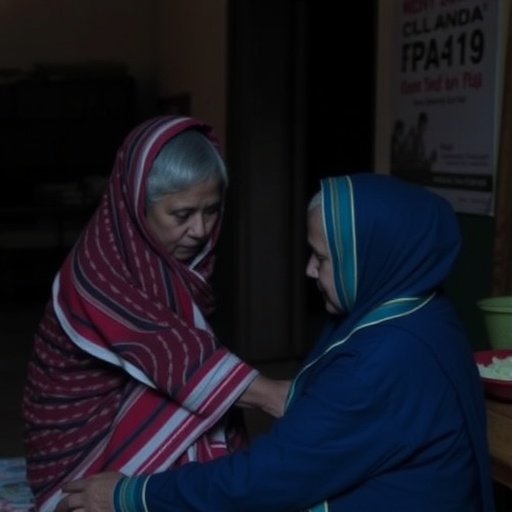Psychological well-being among older adults is a vital topic that warrants attention, especially in developing countries like Nepal. A recent study conducted by Timalsina, Subedi, Maharjan, and other researchers has shed light on the factors influencing the mental health of elderly individuals participating in daycare centers in Kathmandu. The implications of their findings are significant as they contribute to a more comprehensive understanding of the age-related psychological challenges faced by older adults navigating their golden years amidst cultural and social variances.
In the quest to enhance the quality of life for older adults, psychological well-being serves as a critical marker of overall health. The study examines a collection of variables—social interaction, physical health, and access to supportive services—that directly impact the mental state of seniors. Those living in urban environments, such as Kathmandu, encounter both unique opportunities and challenges, particularly concerning community support systems and healthcare access, which can greatly influence their psychological resilience.
The research was designed as a cross-sectional path-analytical study. This approach allowed the researchers to explore multiple variables simultaneously and assess how these factors interrelate to affect psychological well-being. By evaluating data collected from elderly participants in daycare centers across Kathmandu, the study aimed to identify critical predictors that can inform targeted interventions to improve their quality of life.
While aging is a universal experience, the specific cultural context in which individuals age can affect their psychological well-being. In Nepal, traditional values and communal living arrangements are often juxtaposed with the increasing nuclear family structure. This transition can lead to feelings of isolation amongst older adults who, historically, might have relied on strong familial ties for emotional support. Recognizing this shift is essential in developing strategies that reconnect seniors with the broader community and reduce loneliness.
Social interaction emerged as one of the strongest predictors of psychological well-being in the study. The evidence suggests that engaging with peers and fostering new relationships within daycare centers can significantly impact mental health. Programs that encourage social participation, such as group activities or shared learning experiences, are not just beneficial—they are essential for providing the emotional sustenance needed by older adults to thrive.
Equally important is the aspect of physical health, which the study examined in conjunction with social dynamics. There is a clear correlation between a senior’s physical condition and their mental state. Participants who reported engaging in regular physical activity, whether through structured exercises or casual walks, showed improved levels of psychological well-being. This finding emphasizes that health promotion should not only focus on physical ailments but also embrace mental health as an integral part of overall health.
The accessibility of supportive services plays an equally critical role in improving the psychological well-being of older adults. Daycare centers can serve not only as a place for social interaction and physical activity but also as a hub for information on healthcare and community support. Ensuring that seniors are aware of and can easily access these resources can empower them to take charge of their mental health and well-being.
Importantly, the study also highlights the need for mental health awareness campaigns tailored for older adults. Although there is a growing acknowledgment of mental health issues in the broader community, the unique challenges faced by senior citizens often go unaddressed. Educational programs that inform older adults about mental health resources can significantly demystify the stigma often associated with seeking help.
Another noteworthy aspect of the findings is the interplay of gender differences in psychological well-being. It was observed that women attending daycare centers faced distinct challenges, often influenced by societal expectations and roles. Addressing these gender-based factors is crucial in developing comprehensive mental health strategies that cater to the diverse needs of aging populations.
In conclusion, the findings from Timalsina and colleagues offer a roadmap for improving the psychological well-being of older adults in Kathmandu. By focusing on social interactions, physical health, and improved accessibility to vital services, community leaders and healthcare providers can implement effective interventions designed to foster resilience among seniors. Enhanced support systems not only improve individual lives but can also uplift entire communities, creating a more inclusive environment for all ages.
As society progresses, it becomes essential to advocate for the mental health needs of older adults. By channeling attention towards these critical factors, communities worldwide can ensure that the elderly not only survive but thrive in their later years. The time is now for policymakers, healthcare professionals, and community organizers to collaborate in crafting a holistic approach to the aging population’s well-being.
Ultimately, the psychological well-being of seniors is not just a personal journey but a societal responsibility. Our capacity to provide support, foster social connections, and promote physical health will undeniably shape the legacy we leave for future generations. As we draw insights from studies like those conducted by Timalsina et al, we are reminded of our interconnectedness and the need to build bridges toward a healthier, more supportive future for all.
Subject of Research: Psychological well-being among older adults attending daycare centers in Kathmandu, Nepal.
Article Title: Factors associated with psychological well-being among older adults attending daycare centers of Kathmandu, Nepal: a cross-sectional path-analytical study.
Article References:
Timalsina, R., Subedi, M., Maharjan, N. et al. Factors associated with psychological well-being among older adults attending daycare centers of Kathmandu, Nepal: a cross-sectional path-analytical study.BMC Geriatr 25, 973 (2025). https://doi.org/10.1186/s12877-025-06506-3
Image Credits: AI Generated
DOI: https://doi.org/10.1186/s12877-025-06506-3
Keywords: psychological well-being, older adults, daycare centers, social interaction, physical health, access to services, community support, Nepal.




